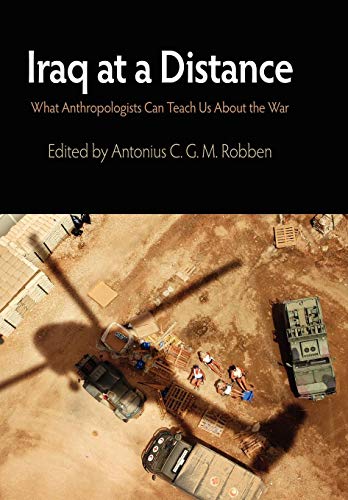Items related to Iraq at a Distance: What Anthropologists Can Teach...
Iraq at a Distance: What Anthropologists Can Teach Us About the War (The Ethnography of Political Violence) - Hardcover

"synopsis" may belong to another edition of this title.
Preface
This volume is not a typical anthropology book about Iraq. The essays have been written in the midst of the Iraq War and lack, therefore, the hindsight that often benefits scholarly analyses. Moreover, the contributing authors did not conduct the long-term fieldwork that customarily underlies anthropological studies. The physical danger to foreign civilians in Iraq has been so great that even experienced war correspondents have for years been able to leave Baghdad's Green Zone only on day trips surrounded by private security contractors or embedded in military units. This book shows, however, that the impossibility of conducting ethnographic fieldwork in war zones such as Iraq does not preempt anthropological interpretation.
This book arose from three pressing concerns in mid-2005: a moral outrage against the Iraq War, the absence of an anthropological voice in professional and public debates, and the similarities with previous armed conflicts worldwide (Robben 2005). The anger and dismay over the steeply rising number of dead as the Iraq War dragged on, the urbicide of Fallujah, the displacement of millions of citizens, the gruesome beheading of kidnap victims, the lethal roadside bombs, the mistreatment of Iraqi civilians—with the humiliation of inmates at Abu Ghraib prison as the first public jolt that there was something profoundly wrong with the war—and the terrible waste of resources in the mismanaged reconstruction of Iraq's infrastructure have been felt by many people, not just anthropologists. Numerous anthropologists voiced their opinions at home, among friends and colleagues, and maybe in the classroom, but few brought their anthropological knowledge to bear on the issues discussed in the public domain. Some anthropologists with expertise in the Middle East wrote op-eds about the ethnocentrism of foreign troops fighting in Iraq and pointed out the blindness of our political leaders to Iraq's turbulent political history and ethnic-religious complexities, but these were lone voices among the political scientists, military historians, foreign affairs specialists, and opinion makers that dominated the media. The absence of an anthropological perspective was all the more surprising because anthropologists have since the 1980s been studying armed conflicts that have many similarities with the Iraq War.
These concerns resulted in the formation of the Iraq Research Project in early 2006, in which a group of anthropologists, seasoned in the ethnographic study of violence, suffering, and armed conflict, were invited to write about the Iraq War. Since then, the American Anthropological Association has examined the involvement of anthropologists in the U.S. military and has been reviewing its code of ethics (AAA Commission 2007). Furthermore, many anthropologists have pledged themselves to the opposition against research and service for the military initiated in 2007 by the Network of Concerned Anthropologists (Members 2007). Anthropological research about the Iraq War has concentrated mainly on the study of U.S. veterans and especially on the ethically questionable employment of anthropologists by the military. This book focuses on the plight of the Iraqi people in this devastating war, waged under the banner of freedom and democracy, through comparisons between Iraq and past and present armed conflicts in Cambodia, Israel, Palestine, Northern Ireland, Afghanistan, and Argentina. The introductory chapter conceptualizes the methodological approach to the study of inaccessible war zones and discusses the importance of comparative anthropology in interpreting the fragmentary, conflicting, and partisan information emerging from those fronts. The five ethnographic chapters analyze, respectively, the Manichaean discourse of the war on terror, the deterioration of women's rights in Iraq, the ethnic-religious partitioning of Baghdad, the loss of popular support for the U.S. and Coalition forces in Iraq and Afghanistan, and the counterinsurgency warfare in Iraq. The volume closes with an epilogue that discusses the anthropological findings from a historical perspective.
"About this title" may belong to another edition of this title.
- PublisherUniversity of Pennsylvania Press, Inc.
- Publication date2009
- ISBN 10 0812242033
- ISBN 13 9780812242034
- BindingHardcover
- Number of pages200
- Rating
Buy New
Learn more about this copy
Shipping:
£ 3.16
Within U.S.A.
Top Search Results from the AbeBooks Marketplace
Iraq at a Distance: What Anthropologists Can Teach Us About the War (The Ethnography of Political Violence) Robben, Antonius C. G. M.
Book Description Hardcover. Condition: New. Brand New Hardcover Book, Crisp and Clean. Seller Inventory # 26120
Iraq at a Distance: What Anthropologists Can Teach Us About the War (The Ethnography of Political Violence)
Book Description Condition: New. Seller Inventory # 5D4000007QO1_ns

